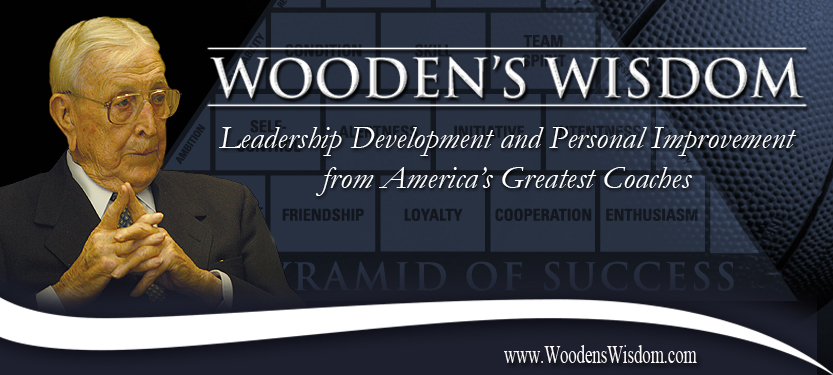 |
|
| Wooden's Wisdom - Volume 3 | Issue 113 |
| Craig Impelman Speaking | Championship Coaches | Champion's Leadership Library Login | |
|
BE SLOW TO CRITICIZE AND QUICK TO COMMEND
This bit of advice from Coach Wooden is reflective of his own coaching style.
In 1975, two professors of psychology, Roland Tharp and Ronald Gallimore, attended fifteen of Coach Wooden’s practices at UCLA and over 30 hours recorded and classified 2,326 acts of teaching by Coach Wooden.
Out of the 2,326 classified acts, 6.9% were verbal compliments or encouragements and 6.6% were verbal statements of displeasure. 6.6% of the acts were uncodable.
The rest of the teaching acts were instructional.
Part of Coach Wooden’s magic as a teacher was that his players were not distracted by undue criticism or undeserved compliments from his communication.
As a result, they were able to focus on the instruction he was giving. Coach viewed his instructional method as a positive approach.
Mr. Gallimore stated that once practice started, Coach became less the friendly grandfather and more the Marine Sargeant. It should be noted that this intensity was delivered with self-control and never any profanity.
Ron Gallimore and Sven Nater wrote a fantastic book, You Haven't Taught Until They Learned, which details Coach Wooden’s teaching process.
In his book Wooden on Leadership, with Steve Jamison, Coach comments very specifically on what he believed were the critical points regarding criticism:
When difficulties arose and strong action—or words—were called for, I made it a policy to criticize in private, not in front of others. The rebuke was done without rancor. I was stern, but I did not get personal—no insults, no berating, no anger, no emotion.
When the discussion or action was over, it was all over. We moved on to other business without lingering anger or animosity. I never wanted to embarrass or humiliate.
The purpose of criticism or discipline is to correct, enhance, educate, modify behavior, or bring about positive change.
It takes great skill to do so without incurring ill feelings, animosity, anger or even hatred.
A leader who lacks the skills necessary in this area will often see his or her attempt to offer constructive criticism reduced to destructive criticism.
You will have damaged your own team by making one or more of its members less effective.
In providing criticism, you must not open wounds that are slow to heal. An individual subjected to personal insults, especially in front of others, can be needlessly impaired.
I also attempted to combine a compliment with criticism when possible. Most people don’t like criticism, even when it’s for their own good.
An acknowledgment—praise—offered as part of the criticism reduces their resistance; for example: “I like your aggressiveness on defense. Can I see some of that when you drive to the basket?”
A statement like this is a method of honestly offering a pat on the back while pointing out a problem and how to correct it. The results were usually productive.
Hope this was helpful.
Yours in Coaching, Craig Impelman
Twitter: @woodenswisdom
|
The Optimist Creed
Promise Yourself Christian D. Larson
|
|
For more information visit www.woodenswisdom.com |
|
© Copyright 2026 WoodensWisdom.com | # of Times Wooden's Wisdom Issues Opened: 7,885,707
Hosting & Design by:EverydayWebDesign.com